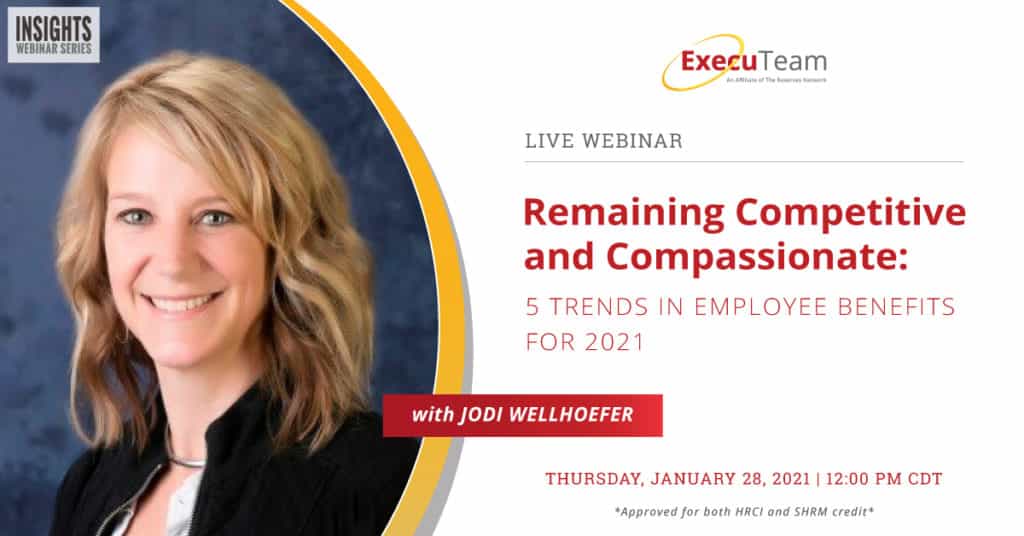By Jodi Wellhoefer
It’s that time of year again: time for companies to examine their current employee benefits and consider their options for increasing value – preferably without increasing cost. This year, such decisions are further complicated (and made more challenging) by a global pandemic.
Unsurprisingly, many companies are focusing on tools to help employees stay mentally and emotionally healthy while they engage in social distancing to protect their physical health. More and more employers are expanding employee benefits for virtual healthcare (telehealth) and increasing access to programs that will help improve and maintain employees’ mental health and well-being.
When weighing the options, an organization may want to know what other companies are choosing as benefit priorities. Not every trend will fit that organization’s needs, but this knowledge will help it remain competitive in its market for both retention and recruitment purposes. (Note that each option can be customized and scaled to meet the needs of that particular organization and workforce.)
Telehealth and Virtual Health Care
Telehealth options have been expanding for years, with both healthcare providers and health insurance carriers offering consumers the option to seek nonemergency care for minor illnesses from the comfort of their own homes. Stay-at-home orders, mask mandates, and social distancing requirements have had a profound impact on people seeking in-person medical treatment, and some telehealth platforms have seen significant jumps in their activity since the pandemic began. To address a clearly rising need, in 2021 “nearly all employers will offer telehealth services for minor, acute services, while 91 percent will also offer telemental health.”
Mental Health Programs
Since April 2020, the pandemic has led to heightened rates of anxiety, depression, and suicidal thoughts among U.S. citizens. Many employers recognize the increased need to support their employees during this time and are looking for health plans that incorporate more mental health benefits. Open enrollment for 2021 is seeing a strong resurgence of interest in employee assistance programs (EAPs), especially those that include behavioral health counseling. More and more employers are providing their employees with access to online mental health resources, including apps, videos, and articles.
Paid Sick Leave and PTO
Before the pandemic, some state and local governments already had their own paid sick leave mandates in place. In the wake of the passage of Families First Coronavirus Response Act (FFCRA) in March 2020, however, more state legislatures across the country are reevaluating their own proposals for paid sick leave. In Wisconsin, for example, state law does not require employers to provide paid sick leave, but several bills on that topic have been introduced in previous years, and it is likely that there will be a resurgence in discussion about this in the near future.
Many employers are also examining their accrued paid time off (PTO) policies and rethinking caps, payouts, and separate sick days. For years, the trend has been to do away with separate sick days and vacation days and combine the hours into one PTO bank. The unintended result has been that many employees choose to report to work sick rather than “waste” a vacation day. Until now the biggest concern was that they’d spread the common cold and the flu in the workplace, but with COVID-19 putting worker safety at much greater risk, some employers have reverted to distinguishing sick days from PTO and encouraging employees to stay home when they are ill.
Some employers are also looking more closely at offering unlimited PTO to avoid caps and carryover and to eliminate payouts. At the same time, other companies are allowing employees to donate their excess PTO to fellow employees who need additional time off.
Childcare Assistance
The COVID-19 pandemic has been especially challenging for working parents. With many childcare centers closed and many public schools teaching their students virtually, working parents must make some difficult decisions about work and childcare. To help alleviate working parents’ stress at home, some employers are upping the ante on childcare benefits so parents can be more focused and productive at work. Some organizations are providing onsite daycare in the workplace, and others are providing virtual activities to keep kids busy at home while their parents are working remotely. Another growing trend is for employers to provide tutoring sessions (either in-person and online) to help their employees’ kids study and finish homework.
Financial Health
The pandemic has people worried about their financial well-being. Concern about risks to their employment status, threats to their income and long-term savings plans, mounting debt, stock market volatility, and the pandemic’s impacts on 401(k) retirement plans is raising everyone’s stress levels. Many employers are providing optional benefits, such as additional life or disability insurance, as well as offering resources and education to help employees reduce their stress and enhance their financial well-being. Some programs include educational sessions on general topics such as reducing debt, and others include complimentary meetings with financial advisors. A few companies have opted to solve their PTO conundrum and financial stress in one fell swoop by allowing employees to directly apply a PTO payout to student loan debt.
What’s Next?
The effects of the coronavirus pandemic are likely to persist for some time, and their final outcome remains unknown. One thing is certain, though: employers who take a proactive approach to helping employees through this time will be in a better position to move forward. By building a better benefits package and investing in its employees’ future, a company will have a workforce that is not only more loyal but also healthy and ready for work.
About the author:
Jodi Wellhoefer is a strategic risk manager at McClone, where she uses her more than 25 years of HR experience to help clients identify risks and design custom strategies to mitigate them. She can be reached via LinkedIn.
Webinar on Employee Benefits:
For a deeper dive on this topic, please join us on Thursday, January 28th for a live webinar with Jodi. This event has been pre-approved for HRCI and SHRM credits.

